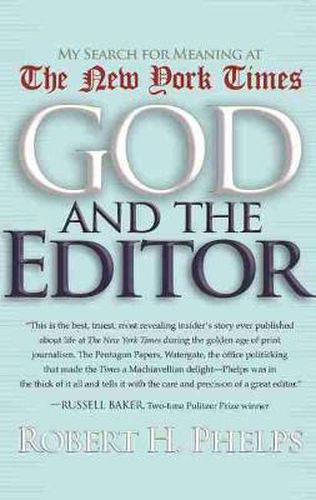Readings Newsletter
Become a Readings Member to make your shopping experience even easier.
Sign in or sign up for free!
You’re not far away from qualifying for FREE standard shipping within Australia
You’ve qualified for FREE standard shipping within Australia
The cart is loading…






For nearly twenty years Robert H. Phelps ran interference for, cheered on, and sometimes scolded star reporters and top editors at the
New York Times . Starting his career as a cub reporter for the
Providence Journal-Bulletin , Phelps joined the
New York Times
as a copy editor, eventually serving as the
Times
news editor for the Washington bureau. Along the way he struggled with balancing his moral ideals and his personal ambition. In this compelling memoir, Phelps interweaves his personal and professional experiences with some of the most powerful stories of the era. With candor and keen observation, Phelps chronicles both the triumphant and the tragic events at the
Times . He explains the missed lessons of the
Pentagon Papers , why the
Times
played catch-up with the
Washington Post
on the Watergate scandal but eventually surpassed it on covering that seminal story, and how the
Times
failed to report a key element of the riots at the 1968 Democratic convention. Phelps offers mixed appraisals of such luminaries as A. M. Rosenthal, James B. Reston, E. Clifton Daniel, and Max Frankel, and expresses great admiration for Seymour Hersh, Neil Sheehan, and Bill Beecher, three unlikely scoop artists. As Phelps settled in at the
New York Times , journalism became the religion he had searched for since his adolescence. Over his tenure of nearly two decades, however, Phelps found that journalism’s stark emphasis on fact was insufficient to address many of life’s dilemmas and failed to provide the sustaining guidance he envied in his wife’s Catholic faith.
$9.00 standard shipping within Australia
FREE standard shipping within Australia for orders over $100.00
Express & International shipping calculated at checkout
For nearly twenty years Robert H. Phelps ran interference for, cheered on, and sometimes scolded star reporters and top editors at the
New York Times . Starting his career as a cub reporter for the
Providence Journal-Bulletin , Phelps joined the
New York Times
as a copy editor, eventually serving as the
Times
news editor for the Washington bureau. Along the way he struggled with balancing his moral ideals and his personal ambition. In this compelling memoir, Phelps interweaves his personal and professional experiences with some of the most powerful stories of the era. With candor and keen observation, Phelps chronicles both the triumphant and the tragic events at the
Times . He explains the missed lessons of the
Pentagon Papers , why the
Times
played catch-up with the
Washington Post
on the Watergate scandal but eventually surpassed it on covering that seminal story, and how the
Times
failed to report a key element of the riots at the 1968 Democratic convention. Phelps offers mixed appraisals of such luminaries as A. M. Rosenthal, James B. Reston, E. Clifton Daniel, and Max Frankel, and expresses great admiration for Seymour Hersh, Neil Sheehan, and Bill Beecher, three unlikely scoop artists. As Phelps settled in at the
New York Times , journalism became the religion he had searched for since his adolescence. Over his tenure of nearly two decades, however, Phelps found that journalism’s stark emphasis on fact was insufficient to address many of life’s dilemmas and failed to provide the sustaining guidance he envied in his wife’s Catholic faith.